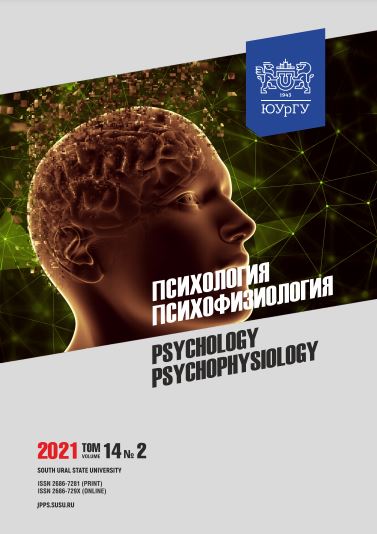ADAPTATION OF THE UTRECHT MANAGEMENT OF IDENTITY COMMITMENTS SCALE-PARENTAL IDENTITY (U-MICS-PI MODIFIED BY K. PIOTROWSKI)
Abstract
Abstract. We present the results adaptation of “The Utrecht-Management of Identity Commitments Scale-Parental Identity (U-MICS-PI)”, modified in 2018 by Konrad Piotrowski. Materials and methods. The study involved 82 participants: 42 women and 40 men aged 25 to 56 years (M = 37.12; SD = 2.80). The results of U-MICS-PI were compared to the results of “Dimensions of Identity Development Scale (DIDS)”. Results. The statistic analysis of the data let us conclude that Russian version of U-MICS-PI has been shown to be a generally valid and reliable psychometric technique for assessing parental identity processes. Conclusions. The Utrecht-Management of Identity Commitments Scale-Parental Identity (U-MICS-PI) has been successfully translated and adapted on a Russian sample. The scale can be applied in psychological counseling and for further identity-related research.
Downloads
References
2. Crocetti E., Schwartz S.J., Fermani A., Meeus W. The Utrecht-Management of Identity Commitments Scale (U-MICS). Italian validation and crossnational comparisons. European Jour-nal of Psychological Assessment. 2010; 26: 172–186. DOI: 10.1027/1015-5759/a000024
3. Hatano K., Sugimura K., Luyckx K. Do Identity Processes and Psychosocial Problems In-tertwine with Each Other? Testing the Directionality of Between- and Within-Person Associations. J Youth Adolescence. 2020; 49: 467–478. DOI: 10.1007/s10964-019-01182-0
4. Bogaerts A., Luyckx K., Bastiaens T. et al. Identity Impairment as a Central Dimension in Personality Pathology. Journal of Psychopathology and Behavioral Assessment. 2021; 43: 33–42. DOI: 10.1007/s10862-020-09804-9
5. Vosylis R., Erentaitė R., Crocetti E. Global Versus Domain-Specific Identity Processes: Which Domains Are More Relevant For Emerging Adults? Emerging Adulthood. 2018; 6 (1): 32–41. DOI: 10.1177/2167696817694698
6. Maurer T.W., Pleck J.H., Rane T.R. Parental identity and reflected appraisals: Measurement and gender dynamics. Journal of Marriage and the Family. 2001; 63 (2): 309–321. DOI: 10.1111/j.1741-3737.2001.00309.x
7. Piotrowski K. Adaptation of the Utrecht-Management of Identity Commitments Scale (U-MICS) to the measurement of the parental identity domain. Scandinavian Journal of Psychology. 2018; 59 (2): 157–166. DOI: 10.1111/sjop.12416
8. van Doeselaar L., Becht A.I., Klimstra T.A., Meeus W.H.J. A review and integration of three key components of identity development: Distinctiveness, coherence, and continuity. European Psychologist. 2018; 23 (4): 278–288. DOI: 10.1027/1016-9040/a000334
9. Verschueren M., Luyckx K., Kaufman E.A. et al. Identity processes and statuses in patients with and without eating disorders. European Eating Disorders Review. 2017; 25 (1): 26–35. DOI: 10.1002/erv.2487
10. Williams S.K., Kelly F.D. Relationships among involvement, attachment, and behavioral problems in adolescence: Examining fathers influence. Journal of Early Adolescence. 2005; 25 (2): 168–196. DOI: 10.1177/0272431604274178
11. Fadjukoff P., Pulkinnen L., Lyyra A-L., Kokko K. Parental identity and its relation to parenting and psychological functioning in middle age. Parenting: Science and Practice. 2016; 16 (2): 87–107. DOI: 10.1080/15295192.2016.1134989
12. Marcia J.E. Identity and psychosocial development in adulthood. Identity: An International Journal of Theory and Research. 2002; 2 (1): 7–28. DOI: 10.1207/S1532706XID0201_02
13. Peters J.R., Eisenlohr-Moul T.A., Upton B.T. et al.Characteristics of repetitive thought associated with borderline personality features: A multimodal investigation of ruminative content and style. Journal of Psychopathology and Behavioral Assessment. 2017; 39: 456–466. DOI: 10.1007/s10862-017-9594-x
14. Galanaki E., Leontopoulou S. Criteria for the transition to adulthood, developmental features of emerging adulthood, and views of the future among greek studying youth. Europes Journal of Psychology. 2017; 13 (3): 417–440. DOI: 10.5964/ejop.v13i3.1327
15. Dontsova O.S. The concept of parental identity. Pedagogicheskii zhurnal = Pedagogical Journal. 2014; 6: 10–24. (in Russ.). https://elibrary.ru/item.asp?id=22872770
16. Soldatova E.L., Shlyapnikova I.A. Correlation between ego-identity and maturity of per-sonality. Vestnik Yuzhno-Uralskogo gosudarstvennogo universiteta. Seriya Psikhologiya = Bulletin of South Ural State University. Series Psychology. 2015; 8 (1): 29–33. (in Russ.). https://elibrary.ru/item.asp?id=23211412
17. Borisenko Yu.V. Family factors of parent identity development in the modern world. Vestnik Kemerovskogo gosudarstvennogo universiteta = Bulletin of Kemerovo State University. 2015; 3 (63): 93–98. (in Russ.). https://elibrary.ru/item.asp?id=24305918
References on translit
-Copyright (c) 2021 Psychology. Psychophysiology

This work is licensed under a Creative Commons Attribution-NonCommercial-NoDerivatives 4.0 International License.



